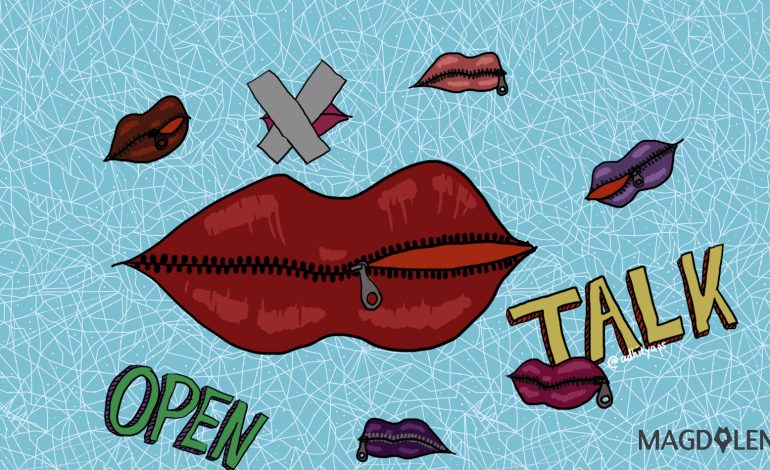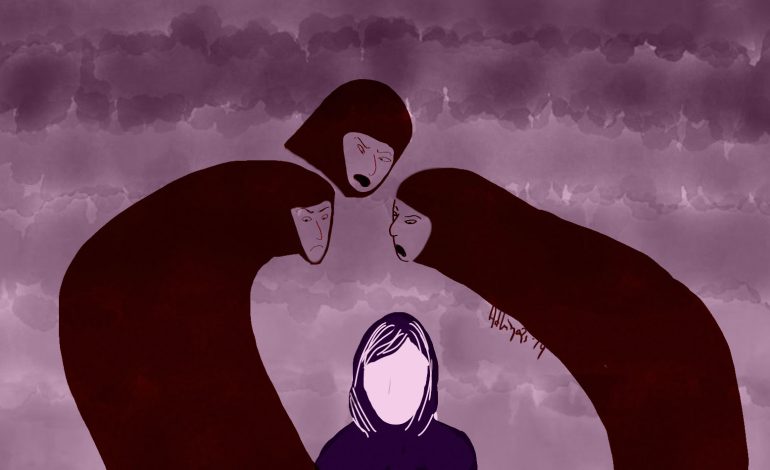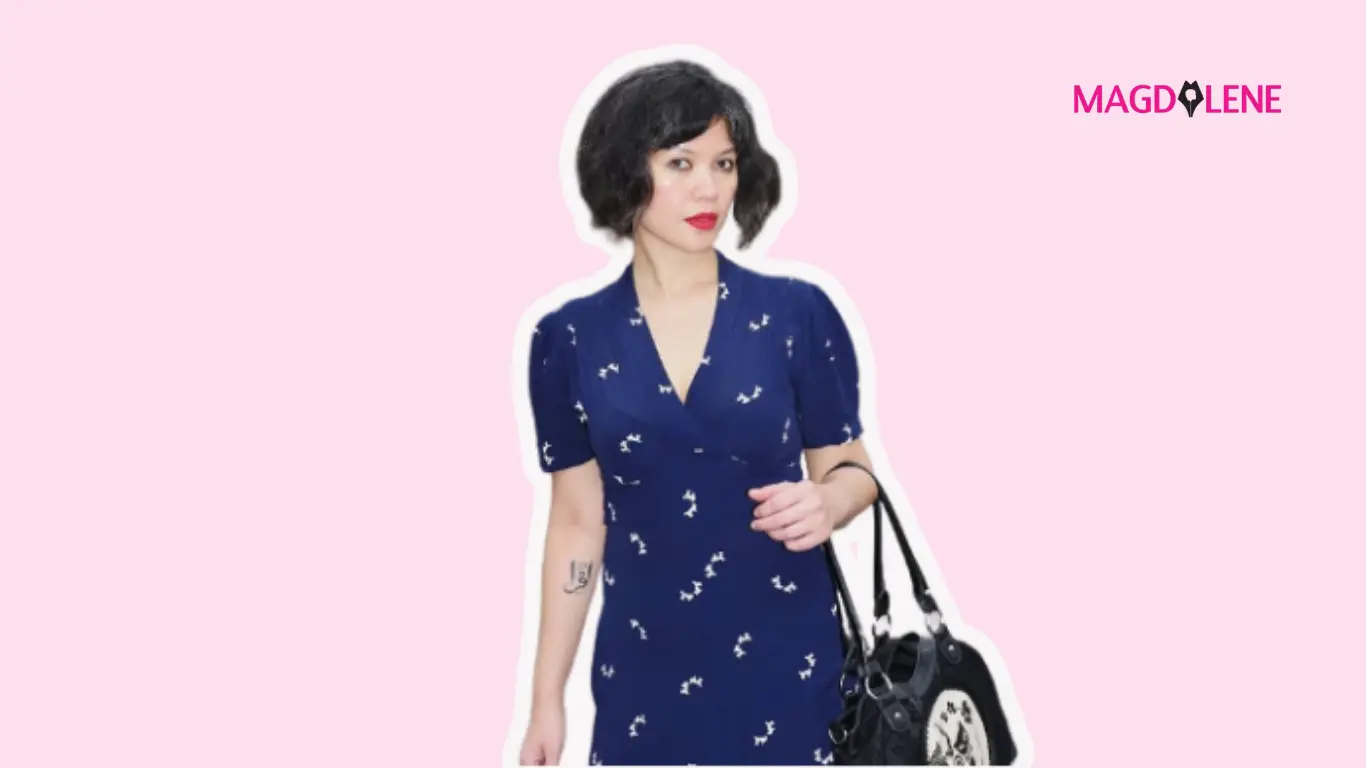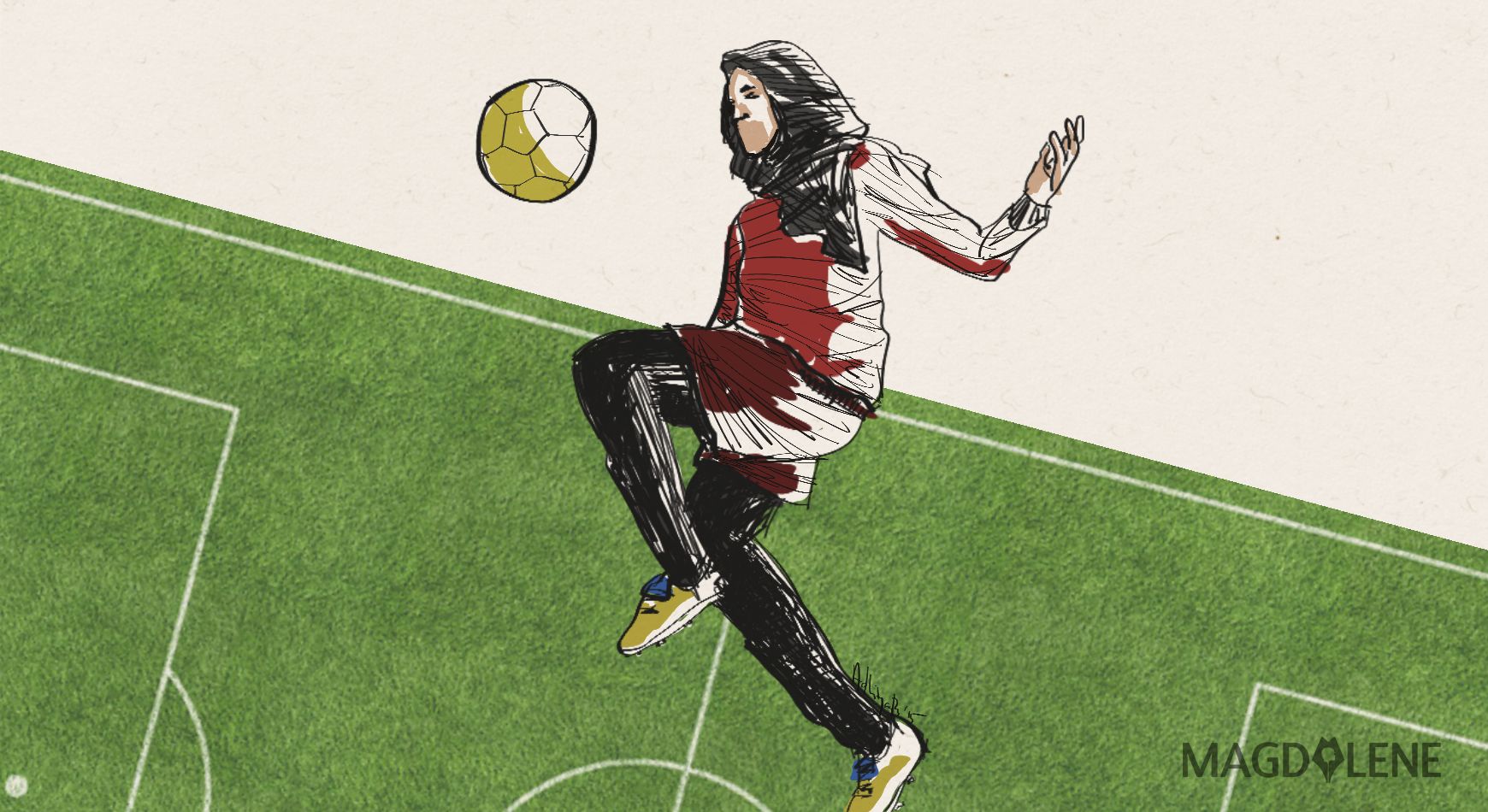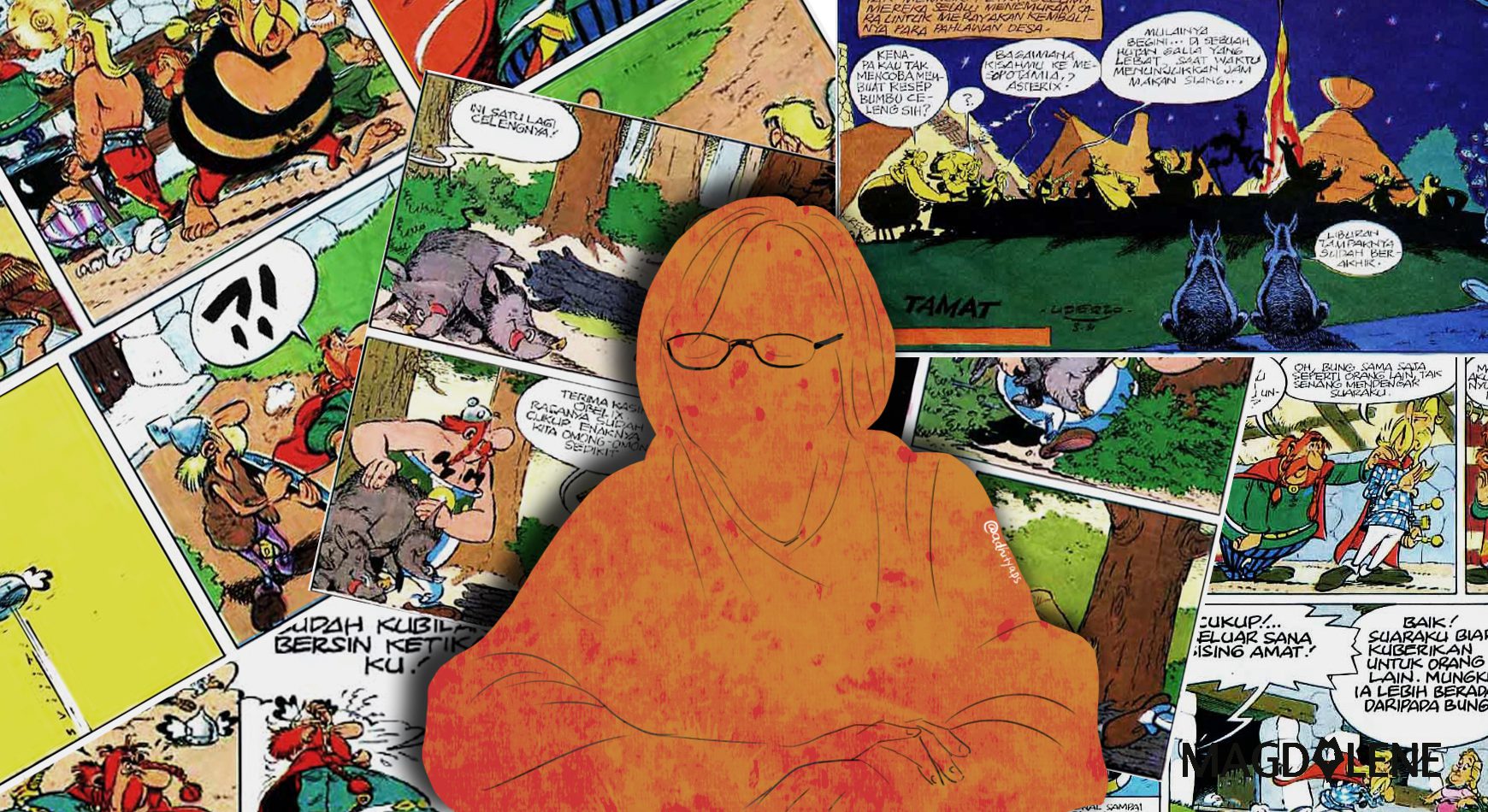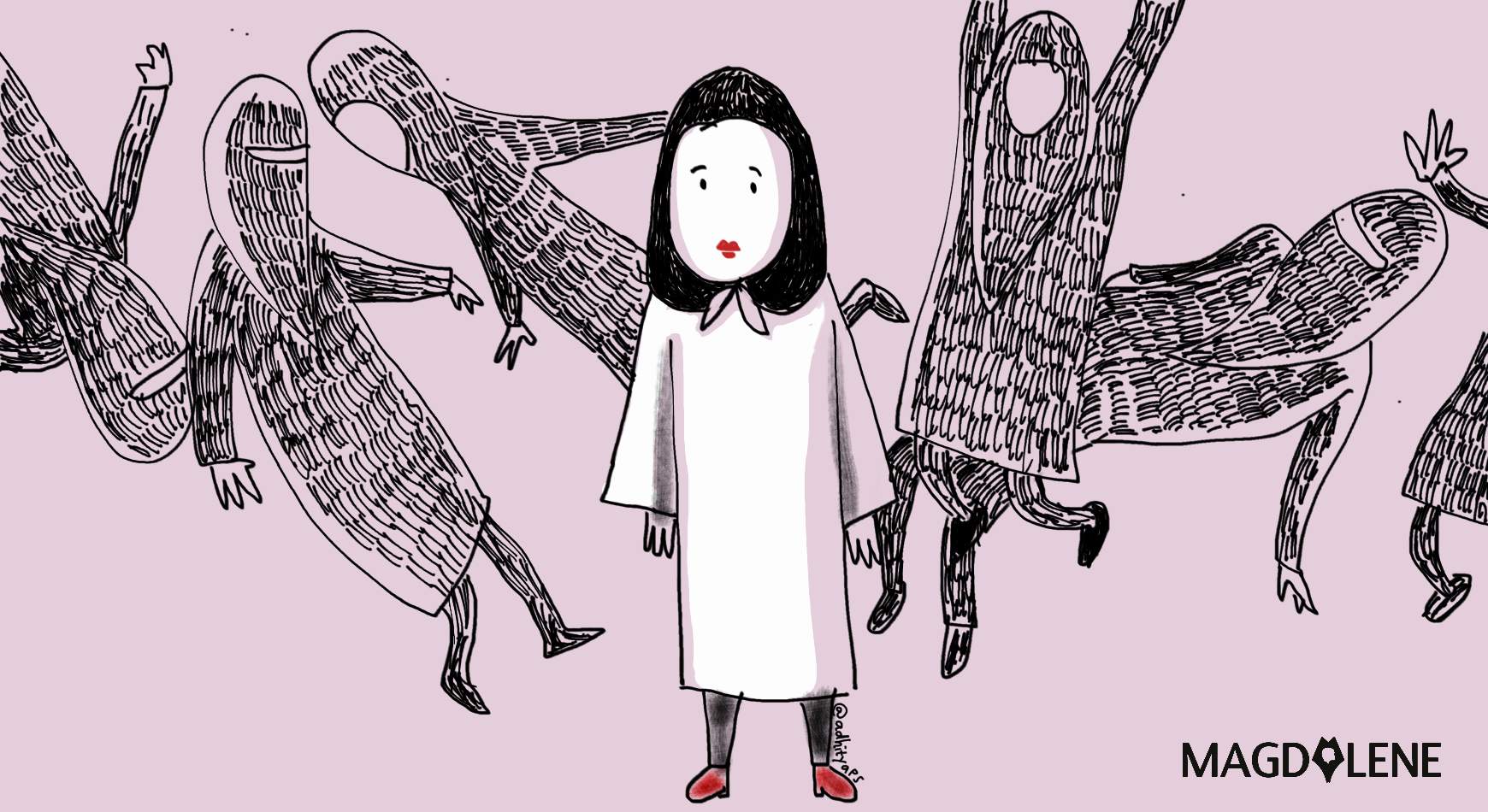Meet amina wadud, the Rock Star of Islamic Feminism
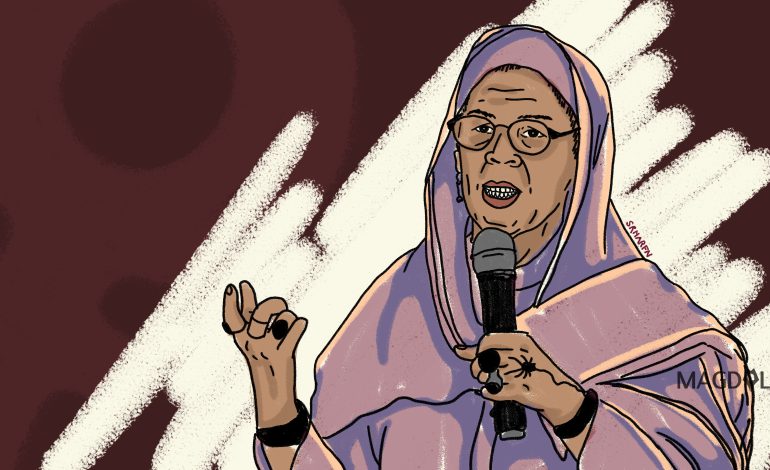
amina wadud distributed the copies of the Quranic verses related to Islam and feminism during a class in Jakarta last year. It was held during Ramadan by Rumah KitaB, a non-governmental research organization focusing on the rights marginalized groups facing discrimination against socio-religious perspective.
There were 35 participants from different professional backgrounds, including public figures like women activist Nursyahbani Katjasungkana, as well as Muslim scholars Ulil Abshar Abdalla and Nur Rofiah. But all of us share the same interest in Islam and gender and we were all star-struck by the presence of the Lady Imam in front of our very eyes.
My introduction to the 68 years old American Muslim philosopher was in 2005, when she created a controversy by leading Friday prayers for a congregation in the United States, going against the general rule that allows only male imam in mixed gender congregations. For someone who had been questioning the very rule and had been asked by non-Muslims about it, I became an instant fan and follower after that.
Getting her PhD in Arabic and Islamic Studies from the University of Michigan in 1988, wadud (who prefers her name in lower case as Arabic alphabets do not recognize capital letters), has focused on relation of gender and Islam. She wrote the quintessential Qur’an and Woman: Rereading the Sacred Text from a Woman’s Perspective, which has since become a seminal work on the topic. She has been part of several civil society organizations and movements that promote principles of equality for women under the principles of Islam, such as Sisters in Islam and Musawah.
As an Islamic scholar, she has a progressive focus on Quran exegesis, or the interpretation of the holy text. That was what she tried to teach us last year in the class, to read the holy text using contextual methods.
wadud said we need to ask the following questions in seeing gender discrepancies in the Quran. Is it a reflection of the historical context? Is it the shortcoming of Arabic language? Is it a reflection of patriarchy? Or a matter of divine intent? How do we know?
We were divided into groups of 2-3, and each group read different verses. My group got Surah Al-Ankabut 28-35, about the Prophet Lot’s people and their abomination, which have been used by many Muslims to reject homosexuality.
“Check the verse. Who is the speaker? Is it God? Is it the prophet? Who or what is this statement made about? Is the message clear? If there is a woman, does she speak?” said wadud.
As we dissect the verses word by word to answer these questions, it became clear that the verses were not crystal clear about homosexuality. There are mentions about “obscenity” and “people of corruption”, as well as “wrongdoers” and “lewdness”. The narrators alternate between God and Prophet Abraham telling the story of Prophet Lot, and other unclear narrator(s). There are a few mentions about Lot’s wife, such as “We will save you and your family, except for your wife, who will remain behind.” But it was not clear what vice she does, and does she speak for her own? Never.
It was such a mind-blowing exercise.
“Compare each verse to other verses. If we find contradictory passages or ideas in the text, choose on the side of equality and justice. If other people can read in patriarchy, you can read in equality and justice. The only way to resolve contradiction is to think,” said wadud.
“No need to be scared of people. You don’t have to be a scholar to interpret the text, it’s your right to do so.”
As she talked about hegemonic binaries in Islamic context, wadud also made a reference Playing in the Dark: Whiteness and the Literary Imagination, a 1992 work of literary criticism by Toni Morrison, which made her class even more exciting.
In between the classes, I had the opportunity to sit and talk with amina wadud and the excerpt is as follows.
Magdalene: So you are now moving to Indonesia. May I know why?
amina wadud: I love this part of the world; I love the weather. I have arthritis, it fits me better. I’m very happy here. My kids, the youngest one is turning 30 today. They have a life of their own and they’re living their lives, and I can always visit them. Because it’s cheaper to live here and visit them there. So I’m hoping to find a place that I can either purchase or, you know, move to.
How did you begin to be interested in Islam, being a daughter of a Methodist priest?
I think being raised in a God-centered household, it was fairly early on that I was clear that there was more to it than just one way. And at that time I just was interested in looking into various Christian denominations to see what’s the same, what’s different. When I was in high school, I lived with families, some were Jewish, Unitarian Universalists…so again, there was this idea that religion is not just one.
By the time I got into the university, I really was interested in Eastern spiritualist tradition and I became a Buddhist and lived in Ashram for a year and practiced meditation and textual practice. And the next year, when I was like 18 or 19, I started reading about Islam. There was a very strong movement in the U.S., so anybody who expressed any interest, they converted them. So I actually went to the mosque to get information and they said, “Oh, you should just take your shahadat (the Muslim profession of faith).” Five months later, I was given a copy of the Quran, which in my mind should’ve come way earlier but nevertheless by that time, I kind of committed myself to some level of practice, to some kind of community. But one time I read the Quran, I really fell in love and that’s really when it made a profound difference.
Did you face resistance from your family?
No, because I was always the odd person out. I was the only one who had ever went to university. I was vegetarian. They were, like, “Ok what else she is bringing home today?” (laugh). And I was already in the university, I wasn’t living at home, so there wasn’t any major issue. My father also had an illness that took his life, and his health deteriorated over the first two years that I was a Muslim until he passed away. So there was never really an opportunity to have any frank theological discussions.
I think my father also never knew about any other version of Islam except for the Black Muslim movement in the United States. At that time the Black Muslim movement was a non-esoteric movement. They didn’t believe in heaven and hell; they didn’t believe in white Jesus. And I’m sure that that seemed like it was a problem even though that wasn’t what the doorway was for me. I did not enter into the doorway, many Muslims did. They also, in a way, had internal movement until they became religious Sunni Muslim. But in the beginning it was a different kind of movement but I didn’t enter into that. But I think my father might’ve thought that, but as I said, I was living away from home, so if I came to see him and visited him at the hospital up until he died, we never really had time to talk about, “what is it you’re doing – do I agree, do I disagree”.
Being a Muslim back then in the U.S. must be very different from now in Trump’s U.S.
I’m sure because that was like over 40 years ago. I’ve been a Muslim for 46 years now. At that time actually there was a very strong movement in the African-American community towards Islam. In the 1930s to 70s, there was a very strong movement of conversion in the African-American community. And being an undergraduate at the University of Pennsylvania, I was right in the heart of Philadelphia. And even today, of all the cities that you might visit in the United States, if you’re in the city of Philadelphia, Islam is very noticeable. It’s got a very strong presence and it is predominantly African-American even though there are Muslims from everywhere. So it was not as strange, but it still was rare.
But Islamophobia wasn’t as apparent as it is today?
No, there was a real lack of knowledge and people were pretty much stuck with that. With Islamophobia, there was a kind of consolidated profiling of types. The Muslims already figured out what was the “type” at that time and Muslims already knew what our type was. So we didn’t really have that palpable quality of hate and prejudice discrimination that goes on profiling everyone now.
So, how did you start focusing on feminism in Islam?
I never studied feminism in Islam. I actually distinguished myself from feminism for 35 years of being a Muslim. I studied Quran because I was interested in the Quran, and when I studied the Quran at my undergraduate university, I was mostly on my own because there wasn’t a really advance level. I started learning Arabic in the early 70s, then I lived in Libya and my Arabic fluency increased. I went to work, just teaching and tutoring in Islamic private schools, then I went to graduate school for Islamic Studies and Arabic. And by that time, I was clear that I really wanted to understand the role of women as promoted by the Quran.

Participants of Islam and Feminism class with amina wadud. (Courtesy of Rumah KitaB)
I had lived abroad; I’d lived in a Muslim majority country. I’ve been around in the communities in the US, which are eclectic, with Muslims from all over the world, as well as home-grown, what you’d call indigenous Muslims. I had already absorbed that there were discrepancies between the ideas about what rights belong to men as Muslims and what rights belong to women as Muslims. I was very curious about where these differences had come from. And so my first question was, is this what Allah intends? And if this is what Allah intends, where would be the source of getting that information that I would best to be able to access? And that was the Quran.
So it worked out well because I was already in love with the Quran, and so I was clear that I wanted to look at that… Even then I didn’t even call it gender. My first book is called Quran and Women, it should be called Quran and Gender. But I didn’t take Feminist Studies, which was just evolving. I took a few random courses at Women’s Studies, but I took all these courses that say Islam is the best way. Here, look at all these researches that say why Islam is the best way, and they always gave me an A but it wasn’t really critical.
I think after I finished my master’s and PhD, and I wrote my dissertation, which became the book Quran and Women…I think it was then that it became clear to me that if you actually, methodically demonstrate discrepancies between certain cultural practices throughout the history of Islam and Muslims, from the Quranic trajectory based on knowledge of the Quran, it was so challenging to the comfort zone and authority given to men, that they resisted.
So I already became controversial when I really was not by personality very controversial. I was actually very conservative. Even Quran and Women as a book, it’s conservative, but in terms of scholarship it’s very rigorous. And, unfortunately, for the patriarchal projection of Islam, it does not support that projection. So it already began to create some problems. But I wasn’t interested in creating problems; I’m just interested in the truth.
It was much more challenging to the mainstream when the basis for your resistance to unequal treatment of women and men was not secular liberal feminism, but it was Quranic.
After I did my dissertation and got my PhD, I came to Malaysia and joined the International Islamic University to teach Quran and Quranic Studies to undergraduates. I began to have a relationship with the women in the communities and the beginning of Sisters in Islam. And that really shifted my thinking from just theory and theology to the level of activism and realities. When both thinking align with that trajectory that I understood from the Quran, it was much more challenging to the mainstream when the basis for your resistance to unequal treatment of women and men was not secular liberal feminism, but it was Quranic. That was even more powerful.
As a consequence, I actually began to experience some relevance in my work. Because before, it was all utopic, like Islam is the best religion in the world, and it does only wonderful things and the Quran says all these wonderful things, but the lived reality is something else. When you start having conversation between these two cosmologies, for me it’s the easy answer that the Quran will come first but how come we’re not living it? And trying to figure out not only how come we’re not living it, but how to live it. What were the steps needed to be put into place to follow that, putting it on the trajectory was actually revolutionary?
I left Malaysia in 1992 and Sisters in Islam started in 1987 but I didn’t join until 1989. And Musawah was launched in 2009 and by that time I identified as an Islamic feminist. I actually wrote critically about the … shaping of feminism, which was very secular, very white, and very class-elitist in its origin for it to relate to me as an African-American woman and a Muslim. There are a lot of things that need to be looked into.
Actually in 1995, at the Beijing World Conference of Women, it became clear that Muslim women’s issues were being put into a kind of battleground between the secular feminist and the Islamist. And the Islamists were a hundred percent patriarchal interpretations of Islam and that was fine because Islam is perfect, and the secular had a hundred percent “we don’t know religion” and they were in an agreement that you can’t have Islam and feminism. It wasn’t until those who were in the middle said, “who is defining Islam and how are they defining it? And who is defining feminism or human rights? How are they defining it? And when will the authority be given to us who are also living as Muslims and women to be able to define feminism, Islam and human rights all for ourselves?” And that’s when the shift came in terms of even the work that Sisters in Islam, the right to exert the authority to define not just feminism, but also to define Islam and that’s been the cornerstone of our work.
Because before people just say, “Oh you know what, that’s just Islam.” It’s like whose Islam? How is it defined? And where do they get their authority?” Those are the three questions that you need to ask continually because people are very strategically asserting limits for Islam in accordance to the agenda that they have and patriarchy was one such agenda that has a long history. So people just started taking it for granted. And when we challenge even that history to say, “That was one way of doing it, but there are other ways to do it” and here are the source stacks, here’s the methodology to support the idea that there are other trajectories of Islam, then we became a lot more empowered, but also a lot more controversial.
I can relate with what you call the battleground because Magdalene often talks about that trajectory and redefining Islam, like, is feminism in Islam oxymoronic or is there actually an intersection. And we are being attacked by both the right who say we’re liberal, and the left who say we are Islam apologists.
Yeah, that was what happened to us in the 90s, and it turned out also to strategically be a very good turning point, because then we had to figure out what is our identity. Because the Islamists said that we were secular feminist and the secular feminists said that we were Islamist. We were not either one of them. So, technically, not having an identity, and so clarifying both for ourselves and for the projection of our work and our relationship to larger communities took the next 10-15 years. By the time the launching of Musawah took place and we became a part of the global movements.
So now we teach the methodology of combining Islam and human rights for the dignity of women. It’s a lovely journey for me because everything just opened itself up to the next thing in a way that I was allowed to grow and change and learn and teach, and at the same time being a part of movements to implement what was being grown and what was being taught. So yeah, it’s a great blessing. But I didn’t know about it when I got into it, I only know that the dissertation I wrote that I became the book. I just get my royalty payment, twice a year from Quran and Women, it’s still making money. You know it’s like 27-something years old… so I mean it’s a blessing, really, to think about it.
Musawah focuses on family law, why is that?
Yes, the reason is that we have to work within an instrument, implement it within the context of the nation state. Many Muslim countries or non-Muslim countries with a large Muslim population that are minority will establish courts to adjudicate the matters that most relate to women and women’s well-being. They are family law courts, or personal status law courts. The fundamental understanding of those courts is that men are in charge. To dismantle the rubric of men’s superiority at a pragmatic level means challenging the established means of laws that support certain notions that actually violate in many ways the constitutional equality that is guaranteed to the same women in the context of direct nation-state. So strategically it’s a very powerful tool, otherwise it’s just too big.
We get to align with very specific kind of projects. For example, each country must give a report to CEDAW for the documents that they have become signature forms and each country is also permitted a shadow report. The shadow report is the unofficial report by women’s activists on the ground to say they’re telling you that they’ve been handling this and this is what is really happening on the ground.
It became a very powerful tool because it puts the nation state under its international connection empowering women on the ground to talk back to the state. But that also took time because CEDAW (The Convention on the Elimination of all Forms of Discrimination Against Women) was not in the UN and all its bodies was not qualified to interrogate the interpretation of Islam that came down the road. They were also believing that their job was to be hands off.
One of the ways that Musawah has worked with CEDAW and nation state to nation state’s agendas for women is to actually teach people in the UN about definitions of Islam. Like, who defines it and how, and we say if it’s defined by these things, how come these things are not put into these principles of Islam or these reservations on these international document and everything, so that took a lot of time and it’s not a hundred percent replaced, but it’s becoming more and more effective as we just keep on doing it.
Eventually, even in the UN, they said, “You know what? You defining Islam, what about these ways based on these principles” and all of a sudden we can no longer come to this body and say “Well you can’t do anything about it cause it’s Islam” because that body is also asking “whose interpretation of Islam are you using?”. It’s slow, but it’s happening.
One of the thorniest issues among Muslim women is hijab. What is actually said in the Quran about hijab?
First of all, there’s nothing said in the Quran about the hijab. There are some statements in the Quran about women’s dress, they’re taken one hundred percent from the style of the dress that existed at that time and place, and I used those based on things I presented in the first two sessions here. I use those as reflections of a general principle, and that general principle is modesty. But you cannot restrict modesty to only one form.
I don’t believe that hijab is a requirement of the religion. But it is personally my preference for my public work. I don’t wear it at home, I don’t wear it in my neighborhood, I don’t wear it when I go for some shopping, but when I were in public I do and it’s because I have a different relationship with symbols. This is one of the clearest, symbolic representations of Islam. And in that way, I identify this as a public performance. But I don’t see it as a requirement and I don’t see it as the only expression of modesty.
But because hijab is so politicized in a negative way, under the roof of Islamophobia, I am implying even more incline to assert it. So, for example, after 9/11, I was always subject to additional screening because I wore hijab at the time and I wear long dreadlocks as well, so it was like a nightmare. Because I would choose not to wear it, people were saying “why don’t you just go through the thing and not wear it?” I was, like, “No, no, why would I not identify with the people being the most oppressed?”
Compare each verse to other verses. If we find contradictory passages or ideas in the text, choose on the side of equality and justice. If other people can read in patriarchy, you can read in equality and justice. The only way to resolve contradiction is to think.
You know, I do also identify with wearing hijab, and recently when I went to Bali or something like that, I realized, “Oh, I’m in a Muslim majority country, they would let me wear if I have to they won’t pass at me, and if I don’t, they won’t pass on me either.” So, for the first time in 18 years, I went through security without having on hijab. That was, like, huge for me, because we have to see that there are politics related to it as well, and I don’t feel like my dress should be subject to the convenience of Islamophobes. Like, you don’t get to determine for me how I dress. Even your hate and your laws say that you don’t get to determine it for me. So obviously I believe in the wearing of choice and I believe in the taking off of choice. Because I both wear it and don’t wear it, I live in one hundred percent a place of choice, and that’s where I am.
What about niqab or burqa?
Well first of all, I chose to wear niqab myself for four years. I was in the United States and then I moved to Libya and I was still wearing it. And when I was in Libya, I stopped wearing it. But it was possible to wear the niqab by choice as well. Unfortunately, because of the politicization of the discussion, it is a long way before we know what would a person do if they were totally free. That is, if they were free to wear whatever they wanted, nobody said anything, would that be as big a deal? Even for the wearer? As it is to those who are resisting it? I don’t know.
So, until we actually accept people in the full range of their choices, we can’t know about what is the full spectrum or full range of women Muslim and their dress. We can’t know. So I support this movement going on terribly in Iran just as much as I support the burqini protest that is going on in France. They emphasize on two different things, but they’re all about women saying we give the same, that’s my body my choice.
Now that you’re living here, how do you see the increased conservatism?
Yes, it’s interesting because many people have been pointing this out to me. I’m a little bit insulated living in Bogor and not speaking fluent bahasa. But also because I lived in Malaysia and actually it is way worse in Malaysia. Malaysia goes under the guise of a little bit more modern, a little bit more economic prosperity, but extreme Islamists is a really more rampant.
So, I’ve lived around it, so it still seems to be less in Indonesia but it is growing. It is in the favor of the Indonesian people to arrest the force of it by promotion of all kinds of tolerant, diverse representation of Islam. You just have to load the ways with more of the history of the tolerant nature that is typical of Indonesians. We have to make that the loudest part of the public.
The thing is we give more attention to the extreme voices and because we do, it seems as if they’re greater in number than they really are. Or that they have greater favor. They’re fighters, they make people afraid, so we really need to flood the waves with more conversation about just generic Indonesian Islam. And then it won’t seem so overwhelming. Because it is. It’s negatively overwhelming, and that’s part of the effect. We shouldn’t want that effect, and I think that they don’t have as much clout as they pretend they do. But they have enough to make other people afraid and so that’s the clout. That’s why we have to proliferate the friendlier messages.
But it’s worrying, like public schools are getting more conservative. And everywhere we go, more and more women are wearing hijab. My friend said when she was going to the church, she was genuinely taken aback, “Wow, it’s odd that nobody’s wearing hijab. Oh, wait a minute. I’m in a church.”
(Laugh) That’s right, you don’t go somewhere without seeing…. It does proliferate. It’s funny because I have to walk my neighborhood every morning, I tried to walk every morning because of my age and my arthritis and all that stuff, and I mostly go with a T-shirt, sometimes gym pants. And sometimes I think to myself, because everybody in the neighborhood wears hijab, “Are you showing off?” And actually, at the time that I go there are so few people that are out and about, and I always say, “Pagi, Bu/Pak. Apa kabar, Ibu.” and just trying to be neighborly, but the opportunity for me to walk with just a t-shirt on is rare. I can’t do it in the country like the United States because we got that other thing that’s going on there and I need to represent myself as a Muslim because I don’t want other things to come…I’m Muslim here, I don’t have to dress to go with it.
I went to the mosque with my T-shirt on, I just bring along scarf to do the prayer part, and I take it off and I get up and everything, I’m finally whole. My body is whole. I’m not fighting a war all the time with my body so I will have that choice to a Muslim woman. I don’t have to fight that here, so it is a pleasure. But sometimes, I worried, I said, “Are you showing off?” Because I would never, I mean, stay in an island… I went to Madagascar, which is an island, we have our own little private beach, so I’m in a sort of regular bathing suit, like a one-piece, but not like a burqini. And my friend, who’s also a Muslim, from the UK, she would go to the village to buy food, and she would wear just the shirt on. I mean, I could not go that far, so I have to put back on more clothes. I could not go with my chest all out, in my bathing suit, so I had to put on a regular T-shirt, so I’m not comfortable in certain levels of dress. Even on an island, if I’m going to meet other people, but I swim in a bathing suit like this, you know. So it’s a really funny thing because I noticed it more as I get older that the right to be able to choose my own body politics is very rarely given to me. So, when I walk in my neighborhood, I can do that, but you know, I wouldn’t be able to do that in many places.
But yeah, I do notice more (people are wearing hijab). Since the first time I lived here, which was 2008 to 2009, so in those ten years, I do notice more. Because I also wear (hijab) and I take it off as I want to as well, and I only started doing that when I was here. Living here the first time, I realized I don’t have to defend Islam. I’m not a walking poster for Islam, I’m just another person out here in the community, and most of them are Muslims, it took a weight off my back. So my first time to experience what would it be like to walk all the time without my hijab on is living here, and I said that I’m okay with this. But as I said, I wouldn’t go with a tank top, that’s not me. I came back here so I can enjoy taking it off. I’m not here for anybody’s pleasure or inspection, so if you don’t like that I don’t wear it, that’s your problem. Just as I would tell the Americans, if you don’t like that I do wear it, that’s your problem.
We also received quite a number of articles from the women who took off their hijab and receive a lot of backlash.
I used to say that most people give that backlash because they’re jealous, like, “Why do you get to take yours off while I have to wear mine?” I mean, like, that’s your problem.
So, are you doing your research here?
This first year, I must admit, I’m flaunting being retired, just trying to make some friends for safari, I’m going to South Africa next month. I’m enjoying not having to do anything except for what I want to do, because I’m a workaholic and I have five children. So, I never got the chance to do whatever I wanted to do for more than a minute, so I’m just flaunting it.
But I need to get to do some writing, which is why I left the U.S., I didn’t plan to stay, but this happened in such a good way. But yeah I want to do some writing from this research on sexual diversity and human dignity, and also I put in a proposal for a book about progressive ideas about the summit of spirituality and devotional practices. A kind of a progressive version of the five pillars, so I can talk about women imams, and also talk about the ways which people connect themselves to Allah, that include the regular five pillar that also extends it beyond itself.
After I made hajj, I ran a proposal that was accepted like, okay, here’s a chapter, and I never get any further. So I’d like to make that book, sometimes when people think of a book, to know about the fact that there are lady imams. Because if you learn about lady imams, it has to be like on a marginal discussion, on a marginal aspect, but no. It’s just a part of a regular Islamic salah (prayer), so, inshallah (God willing). Put me in your dua’ (prayer), because the idea is good but the discipline really sucks.

